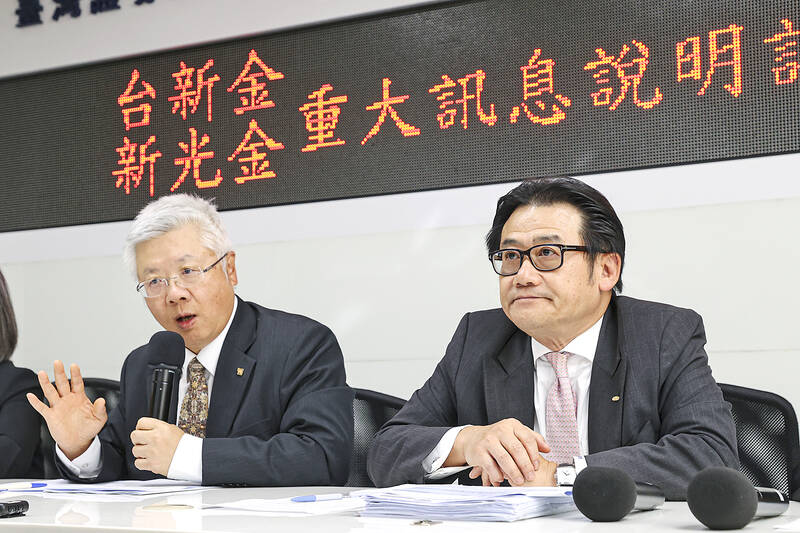Taishin Financial Holding Co (台新金控) yesterday raised its terms to merge with Shin Kong Financial Holding Co (新光金控) via share swaps, in a bid to compete with a rival tender offer from CTBC Financial Holding Co (中信金控).
Tashin Financial president Welch Lin (林維俊) and Shin Kong Financial president Stephen Chen (陳恩光) unveiled the revised share swap schemes at a news conference at the Taiwan Stock Exchange in Taipei last night.
Under the new terms, Taishin Financial plans to issue new shares for Shin Kong Financial shares, with a share swap ratio of 0.672 Taishin Financial common shares for one Shin Kong Financial common share, and one Taishin Financial preferred share for 0.175 Shin Kong Financial preferred share.

Photo: CNA
The preferred shares would receive an annual interest rate of 1.665 percent before their buyback three years later, Lin added.
The revised terms would suggest a merger price of NT$14.18 per share, a 25 percent increase from NT$11.32 per share it proposed last month, and a 5 percent premium over Shin Kong’s closing price at NT$13.5 yesterday, Lin said.
CTBC Financial last month proposed buying 51 percent of Shin Kong Financial shares on the open market and via share swaps totaling NT$14.55 per share.
The changes are intended to speed up the merger, which still needs approval from the Financial Supervisory Commission and separate shareholders’ meetings next month, Lin said.
The arrangements would allow Taishin Financial to keep more than NT$20 billion (US$622.96 million) of cash on hand to meet unforeseen scenarios, he said.
Hopefully, regulators and shareholders would give favorable considerations and reject CTBC Financial’s hostile takeover attempt, Lin said.
“Taishin Financial’s offer is solid and will be written into the merger document while CTBC Financial’s terms might be shrinking due to its recent share price corrections,” he said.
The term revisions came after Taishin Financial used second-quarter earnings data to evaluate the deal, while last month’s offer was based on first-quarter financial results, Lin said.
Shin Kong Financial’s 15-member board voted 11 to 4 in favor of merging with Taishin Financial as the two companies share a common corporate culture, Chen said.
After the merger, Shin Kong Financial would become part of Taishin Financial and the new entity would be renamed Taishin Shin Kong Financial Holding Co (台新新光金控).
Chen warned Shin Kong Financial shareholders against too-good-to-be-true terms put forth by CTBC Financial, saying it might sacrifice the interest of the remaining 41 percent shareholders.
Lin also challenged CTBC Financial to shed light on the details of its merger plans for Shin Kong Financial given its low cash available.
On Tuesday, CTBC Financial said it would adopt the new title of CTBC Shin Kong Financial Holding Co (中信新光金控) and retain all Shin Kong Financial employees for three years if its bid for Shin Kong Financial moves forward smoothly.

NEW IDENTITY: Known for its software, India has expanded into hardware, with its semiconductor industry growing from US$38bn in 2023 to US$45bn to US$50bn India on Saturday inaugurated its first semiconductor assembly and test facility, a milestone in the government’s push to reduce dependence on foreign chipmakers and stake a claim in a sector dominated by China. Indian Prime Minister Narendra Modi opened US firm Micron Technology Inc’s semiconductor assembly, test and packaging unit in his home state of Gujarat, hailing the “dawn of a new era” for India’s technology ambitions. “When young Indians look back in the future, they will see this decade as the turning point in our tech future,” Modi told the event, which was broadcast on his YouTube channel. The plant would convert

‘SEISMIC SHIFT’: The researcher forecast there would be about 1.1 billion mobile shipments this year, down from 1.26 billion the prior year and erasing years of gains The global smartphone market is expected to contract 12.9 percent this year due to the unprecedented memorychip shortage, marking “a crisis like no other,” researcher International Data Corp (IDC) said. The new forecast, a dramatic revision down from earlier estimates, gives the latest accounting of the ongoing memory crunch that is affecting every corner of the electronics industry. The demand for advanced memory to power artificial intelligence (AI) tasks has drained global supply until well into next year and jeopardizes the business model of many smartphone makers. IDC forecast about 1.1 billion mobile shipments this year, down from 1.26 billion the prior

People stand in a Pokemon store in Tokyo on Thursday. One of the world highest-grossing franchises is celebrated its 30th anniversary yesterday.

Zimbabwe’s ban on raw lithium exports is forcing Chinese miners to rethink their strategy, speeding up plans to process the metal locally instead of shipping it to China’s vast rechargeable battery industry. The country is Africa’s largest lithium producer and has one of the world’s largest reserves, according to the US Geological Survey (USGS). Zimbabwe already banned the export of lithium ore in 2022 and last year announced it would halt exports of lithium concentrates from January next year. However, on Wednesday it imposed the ban with immediate effect, leaving unclear what the lithium mining sector would do in the